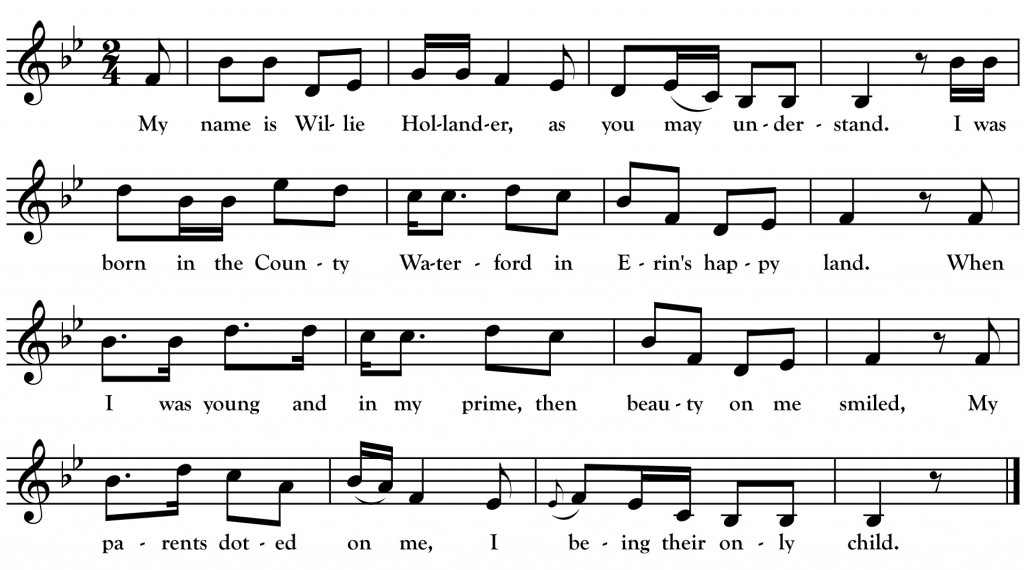The Roving Irishman
I am a roving Irishman that roves from town to town,
I lately took a notion to view some foreign ground,
So with my knapsack on my shoulder and shillala in my hand,
I sailed away to America to view that happy land.
When I landed in Philadelphia the girls all laughed with joy,
Says one unto another, “There comes a roving boy.”
One treated to a bottle and another to a dram,
And the toast went ’round so merrily, “Success to the Irishman.”
The very first night at the house where I was going to stay,
The landlady’s daughter grew very fond of me;
She kissed me and she hugged me and she took me by the hand,
And she whispers to her mother, “How I love this Irishman.”
It was early next morning when I was going away,
The landlady’s daughter those words to me did say,
“How can you be so cruel or prove so very unkind,
As to go away a-roving and leave me here behind?”
Oh, I am bound for Wisconsin, that’s right among the Dutch,
And as for conversation it won’t be very much,
But by signs and by signals I’ll make them understand
That the spirits of good nature lies in this Irishman.
Now it’s time to leave off roving and take myself a wife,
And for to live happy the remainder of my life;
Oh, I’ll hug her and I’ll kiss her, oh, I’ll do the best I can
For to make her bless the day that she wed with this Irishman.
_________________________________________________
I sang this song for singer Len Graham of County Antrim, Ireland and he immediately recognized it as a version of “The Roving Journeyman” aka “The Little Beggerman.” I learned another version when I was a teenager up in Bemidji, MN but I didn’t realize they were related because I had a different melody (the one often called “The Red Haired Boy”) for my earlier version. Dean’s air is much more somber.
Later, I came across a version, called “The Rambling Kerry Lad,” recorded from Bridget Granbhil of the Dingle Peninsula that is very similar in melody and text to Dean’s version. You can hear Granbhil’s version on the Folkways album Traditional Music of Ireland, Vol. 2: Songs and Dances from Down, Kerry, and Clare. The song was a vehicle for the “traditional creativity” of other “woods singers” in Dean’s childhood home of St. Lawrence County, New York. Two personalized versions, “The Roving Cunningham” and “The Roving Ashlaw Man” were recorded there by Robert Bethke in the 1970s from brothers Ted and Eddie Ashlaw.
We don’t know where Dean learned the song but his version bears the mark of more personalization – this time to the Midwest. The 5th verse is unique to Dean’s collection with its reference to the somewhat non-conversational Dutch of Wisconsin (“Dutch” here almost certainly means German, or Deutsch, rather than the modern usage of the word for folks from the Netherlands). This verse could easily have been composed by Dean himself. In fact, my research has turned up a story of Dean reluctantly leaving Hinckley, Minnesota in 1889 for a brief stint as a bartender in a saloon in Superior, Wisconsin. He didn’t last long there and the Pine County Pioneer even reported that “Mike does not fancy the town.” Maybe this had to do with a German deficiency in the “gift of the gab” (or maybe it was just a crummy job). Also, since Dean was, by all accounts, a sociable bartender for most of his adult life, it’s easy to guess what is meant by “the spirits of good nature!”
_________________________________________________
More detailed information on this song from the Traditional Ballad Index
Listen to other versions online!
Bridget Granbhil’s “The Rambling Kerry Lad”
Ted Ashlaw’s “The Roving Cunningham”
Eddie Ashlaw’s “The Roving Ashlaw Man”




